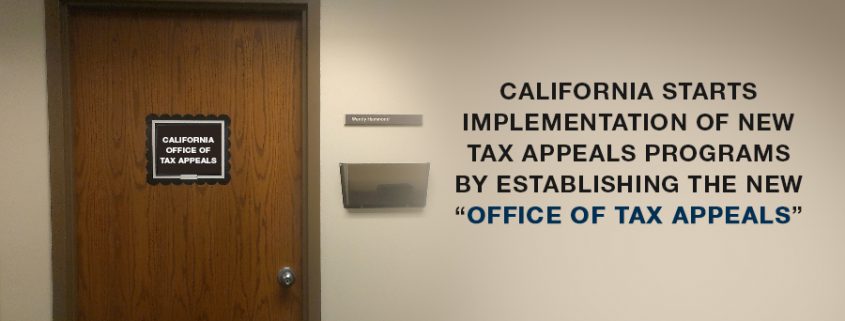California Starts Implementation Of New Tax Appeals Programs By Establishing The New “Office Of Tax Appeals”
On June 15, 2017, the California Legislature passed Assembly Bill 102, which transfers nearly all tax administration and appeal functions from the BOE to two new tax departments: the Department Of Tax And Fee Administration (“DTFA”) and the Office Of Tax Appeals (“OTA”).
Starting January 1, 2018, California State tax appeals will be heard by the Office Of Tax Appeals (“OTA”). Created by the Taxpayer Transparency And Fairness Act Of 2017, the OTA will replace the appellate process once handled by the State Board of Equalization (“BOE”). The BOE handles the enforcement of various types of state taxes – most notably Property Taxes and California Sales & Use Taxes. The OTA will hear and determine all appeals that involve corporate income tax, corporate franchise tax, personal income tax, sales tax, and use tax. If a taxpayer disagrees with the audit findings involving any of these taxes which are reflected on a Notice Of Action or a Notice Of Determination, the taxpayer may file an appeal with the new OTA by the “appeal date” listed on said notice. As of October 1, 2017, any such notice that gets issued will include an insert containing information about appeal rights and the OTA’s contact information. As of October 1, 2017 all appeals need to be filed with OTA, and beginning January 1, 2018, OTA’s three-member panels will hear and determine all appeals. The BOE will cease hearing these appeals after December 31, 2017.
Old System Was “Politically Connected”
The BOE was constitutionally created in 1879 with a mandate that property taxes would be fairly assessed and collected across California. Since that time, the BOE’s statutory authority has been expanded to administer the state’s sales and use tax and numerous other state taxes and fees. In addition, the Board, comprising four members elected from districts and the statewide-elected State Controller, also hears and decides tax disputes. Until the change in the law, California was the only state in the United States where administrative tax disputes were heard by elected representatives. Not only was it allowed but also it was encouraged that taxpayers (or when represented, their attorneys) contact each government official sitting on the five-member BOE panel in ex-parte communications to promote the taxpayer’s position in advance of the hearing.
Designed To Promoted Fairness
On June 15, 2017, the California Legislature passed Assembly Bill 102, which transfers nearly all tax administration and appeal functions from the BOE to two new tax departments: the DTFA and the OTA. The BOE still retains its constitutional duties which going back to its historical roots is the oversight of property taxes and assessment of state-assessed properties. Both the DTFA and OTA would be under the control of respective directors, each appointed by the governor and subject to confirmation by the California Senate.
The DTFA will be based in Sacramento and will administer state and local sales and use taxes, fuel and tobacco excise taxes, and a variety of other taxes and fees. The new law has no impact on State income tax audits which will still be conducted by the Franchise Tax Board (“FTB”) or employment tax audits which will still be conducted by the Employment Development Department (“EDD”). OTA would hear sales and use tax appeals from the DTFA and personal and corporate income tax appeals from the FTB.
The OTA was designed by the State Legislature to operate independent of any other State tax office and provides a venue where disagreements concerning the application of California State tax law can be resolved on a fair and impartial basis for both the taxpayer and the government. The OTA is supposed to take a fresh look at a taxpayer’s case and consider the strengths and weaknesses of the issues in the taxpayer’s case. The advantage of appealing a California State tax audit to this level provides the taxpayer with the opportunity to reach a mutually acceptable settlement without expensive and time-consuming court trials. This approach follows what the IRS and over half the State Tax Agencies have been doing for many years.
Within the OTA, there will be tax appeals panels consisting of three administrative law judges (ALJ’s). These ALJ’s must have state tax experience and each be a member of the California bar. OTA headquarters will be in Sacramento, with hearing offices in Sacramento, Fresno, and Los Angeles. The ALJ’s must issue written opinions for each appeal.
Although the OTA is not a judicial body or a tax court, it is now a step in California Tax Procedure for taxpayers to challenge tax audit decisions. Furthermore, decisions of the OTA can be appealed to California Superior Court for a “de novo review”. “De novo” is a form of appeal in which the court holds a trial as if no prior trial had been held.
Looking To Appeal A California State Tax Audit Report To The Office Of Appeals?
When taxpayers disagree with the findings of their California State tax audits, they may usually appeal to the OTA. The auditor agent will issue a Notice Of Determination to a taxpayer, which essentially provides the taxpayer with the opportunity to file a Tax Protest requesting his or her case be heard by the OTA. Hiring an experienced tax attorney should make a difference in getting the best possible result. The attorneys of the Law Offices Of Jeffrey B. Kahn, P.C. with locations in Orange County, San Francisco and elsewhere in California know how best to communicate directly to tax appellate bodies including the OTA and build a persuasive case on your behalf because we know how to present your case with legal argument and tax authority.


 Follow
Follow Follow
Follow
